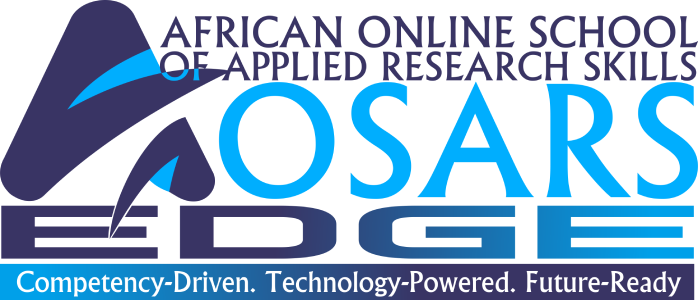TRAINING HELD FOR DOCTORAL SCHOLARS ON SOURCING OF REFERENCE MATERIALS

TRAINING HELD FOR DOCTORAL SCHOLARS ON SOURCING OF REFERENCE MATERIALS
Executive Summary
A comprehensive training session on sourcing research materials for PhD thesis writing was conducted for a new cohort of doctoral candidates. The participants were taken through systematic approaches to locating, extracting, and organizing scholarly materials using advanced search techniques, search operators, and alternative search platforms. The session emphasized strategic sourcing, source credibility, and efficient database population methods.
Introduction and Session Overview
The participants were welcomed to the first module of a series focused on PhD thesis writing skills, which was scheduled to run for approximately nine weeks. It was explained that the primary focus of this inaugural session was on sourcing research materials essential for thesis development. The importance of reference materials in academic writing was underscored, and a structured approach to material acquisition was outlined.
Foundational Concepts in Keyword Extraction and Search Strategy
A sample research topic was introduced to demonstrate content searching techniques focusing on entrepreneurial orientation and business performance. The participants were guided through the process of identifying key considerations for effective searching, which included identification of relevant keywords, document format preferences, document type requirements, and time dynamics and currency of materials.
The direct extraction of keywords from research topics and objectives was demonstrated. Various keywords related to the sample topic were identified. The use of artificial intelligence tools for keyword extraction was illustrated, and the application of these keywords in scholarly search platforms for direct searches was demonstrated.
It was explained that direct keyword searches might not always yield sufficient content. The use of alternative search terms was therefore recommended. The participants were shown how artificial intelligence tools could be used to generate equivalent search terms, including synonyms, terms with different regional spellings, opposite concepts, similar concepts, and indicators of broader concepts. The importance of ensuring that alternatives remained relevant to the specific research topic was emphasized to avoid generating irrelevant results.
Advanced Search Refinement Techniques
The technique of using quotation marks for multi-word keywords was explained. Examples were demonstrated to ensure terms appeared consecutively in search results rather than being fragmented throughout documents. This technique was presented as essential for eliminating false positives and improving search precision.
Commands were introduced to ensure that keywords appeared in document titles, thereby indicating that the documents focused primarily on the research topic. Additional commands were demonstrated for situations requiring multiple keywords to appear in titles simultaneously.
The addition of contextual terms to searches was explained as a method for narrowing results when abundant information was available. Examples were provided showing how adding context such as industry type, geographical location, or specific sectors could align results with research parameters.
Geographical Dynamics and Strategic Flexibility
The incorporation of geographical dynamics into searches was demonstrated by adding country names or city names. The strategic nature of geographical parameters was emphasized, and the participants were shown how to remove geographical constraints to obtain global perspectives, add regional countries to provide broader regional context while maintaining relevance, and combine multiple keywords with locations in their searches.
Contributions from participants highlighted how progressively removing geographical restrictions could broaden searches from city-level to country-level and eventually to global perspectives.
Search Operators and Complex Search Strings
The use of specialized search operators for creating sophisticated search strings was showcased. It was demonstrated how artificial intelligence could assist in generating complex search operators that combined multiple variables and contexts. The logic behind search operator construction was detailed, showing how such operators ensured the presence of core variables, independent variables, performance metrics, and location specifications within search results. This approach was presented as a method for preventing irrelevant documents from being added to research databases, thereby ensuring that downloaded materials were information-rich and directly relevant to research questions.
Document Type and Currency Optimization
The session concluded its coverage of search strategies by demonstrating how search results could be filtered by file type and by time parameters to obtain readily accessible and current documents. The technique of mass downloading search results was briefly touched upon as a method for increasing researcher efficiency. The session then shifted from specialized scholarly platforms to general search engines to explore document types beyond academic papers, while similar keyword and filtering techniques were still applied.
Efficient Material Downloading and Alternative Platforms
The process of efficiently downloading research materials in bulk using alternative search platforms was demonstrated. It was noted that substantial numbers of items could be downloaded simultaneously, representing a significant improvement from downloading only one item at a time. While mainstream scholarly platforms were acknowledged as commonly used, it was explained that alternative platforms allowed for mass downloads, providing larger quantities of materials simultaneously.
The trade-offs between different search engines were highlighted. While some platforms allowed for mass downloading, it was clarified that they might not support all search operators or advanced search functionalities available in other ecosystems. However, it was noted that certain platforms performed better for obtaining large quantities of materials when searching for single, generic items.
It was emphasized that the current focus was on harvesting materials to populate a database rather than on immediate writing, and therefore concerns about the immediate usability of all downloaded materials were set aside. Alternative platforms were presented as useful tools for acquiring numerous materials quickly.
Additional alternative search engines were introduced, with notes that they could facilitate substantial mass downloads and might work when other platforms failed. The observation was made that mainstream search functionalities had become more restrictive over time, making alternatives valuable.
Targeting Specific Document Types
The use of specific phrases as unique identifiers to target particular document types was explained. For various academic document types including theses, dissertations, and books, different identification strategies were demonstrated. It was noted that while these methods were not always perfect, they generally yielded high accuracy.
Leveraging Institutional Repositories
The strategy of targeting institutional repositories rather than searching for specific content directly was discussed. These repositories were presented as reliable sources of academic materials. A registry of open access repositories was introduced to help participants find relevant repositories organized by country.
A challenge in mass downloading materials from institutional repositories was pointed out, as the default option was often one item at a time. A workaround was introduced using specialized search techniques within alternative platforms to enable mass downloads from these repositories.
The identification of academic and government websites through their URL extensions was elaborated upon. Different extensions for educational institutions and government entities were explained. It was shown how these extensions varied by country and how they could be used in searches.
It was explained that researchers could strategically target specific institutions, such as central banks for banking information or government infrastructures for regulatory reports, using their unique website extensions. The use of wildcard symbols to broaden searches to include all government or academic institutions globally was also demonstrated.
Understanding Gray Literature
Questions were raised requesting clarification on gray literature. It was clarified that gray literature referred to information from credible, non-academic bodies that had not undergone traditional academic peer review but was still considered reliable due to its authoritative source. Examples provided included government reports and publications from international organizations.
It was affirmed that general search engines could be used to find gray literature, but the importance of a strategic approach rather than just the tool itself was emphasized. The method of targeting government institutions in specific countries to find credible, non-academic reports was explained, with emphasis placed on how the source of information significantly impacted its credibility.
Source Credibility and Strategic Sourcing
The critical importance of information source credibility was underscored. It was emphasized that the source of information was as crucial as the information itself, particularly in academic writing. The use of credible sources such as government documents, regulatory reports, and academic books was advised, rather than relying on informal sources, to ensure the authenticity and authority of claims.
An example was given of strategic sourcing during a book writing process, where materials were deliberately cited only from books published by top academic publishers to ensure rigorous peer review.
Continuous Practice and Skill Development
The session concluded with an emphasis on the importance of continuous practice to master the learned skill sets for sourcing materials. Strategic sourcing was encouraged, and participants were reminded that developing proficiency in these techniques required ongoing application and refinement.
Conclusion
The training session successfully equipped PhD candidates with comprehensive techniques for sourcing research materials. Participants were exposed to systematic approaches including keyword extraction, alternative search terms, advanced search refinement techniques, geographical search dynamics, specialized search operators for complex searches, and document type optimization. The session also covered efficient downloading methods through alternative platforms, strategies for targeting institutional repositories, understanding and utilizing gray literature, and the critical importance of source credibility. The emphasis on continuous practice and strategic sourcing throughout the session underscored the development of these skills as an ongoing process essential for successful PhD thesis writing.




